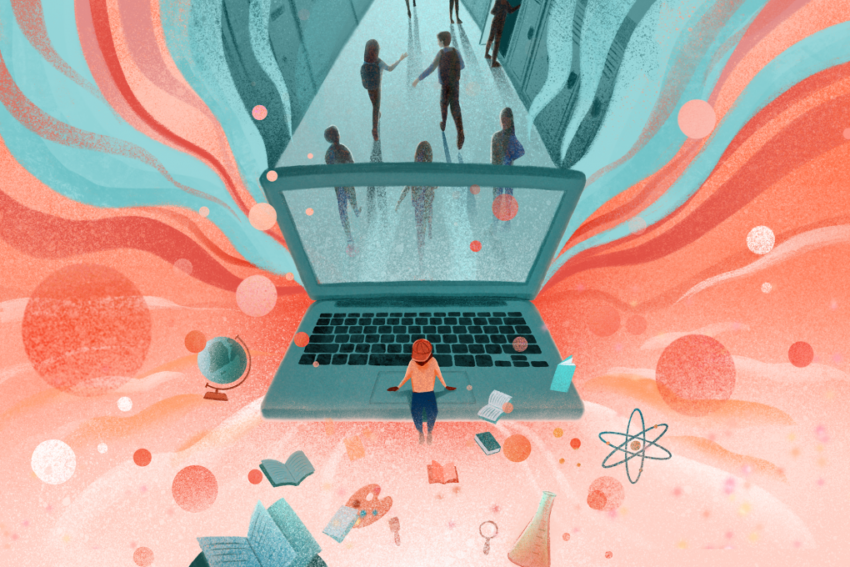
His mother says there are fewer distractions, he can work independently and it has been simpler for him to focus.
“It is like virtually the noise is shut out and we will simply get to the work.”
Center college is hard for nearly everybody, however for Black college students like Josh, college will be even tougher. That is as a result of, along with studying algebra and dealing with social awkwardness, they’re usually navigating an academic system that traditionally hasn’t supported them.
In Texas, college students have been assigned historical past textbooks that downplay slavery and avoid talking about Jim Crow. In Massachusetts, Black ladies have been reprimanded for violating dress codes that ban hair extensions. And throughout the nation, in line with federal knowledge, Black college students are more likely than white classmates to be disciplined at school.
In Oregon, the place Josh lives, Black college students have decrease commencement charges. They’re additionally much less more likely to be recognized as “gifted and gifted.”
All that may take a toll on youngsters. However for some college students like Josh, distant studying through the pandemic has supplied an escape.
In fact, that hasn’t been each pupil’s expertise. Between mental health struggles, limited Internet access and diminished youngster care choices, distance studying is not working for lots of households. Analysis reveals college students with disabilities, these experiencing poverty and Black and Latinx college students are amongst these particularly prone to falling behind.
Nonetheless, for Josh and children like him, studying from house has given them an opportunity to thrive.
“All the time on alert … at all times deflecting”
In school, Josh learns from predominantly white lecturers in lecture rooms stuffed with predominantly nonwhite college students. That demographic disparity is not exclusive to Portland. Nationwide knowledge show the U.S. public college trainer inhabitants is overwhelmingly white, whereas greater than half of the scholars these lecturers work together with are nonwhite. And whether or not it is express or implicit, many lecturers convey some sort of bias into the classroom.
Valerie Adams-Bass is a developmental psychologist on the College of Virginia who research Black youth and media stereotypes. She says usually, within the media, Black college students are portrayed as being bored with training, and Black boys are portrayed as scary or intimidating.
“If that is what the lecturers and directors or their friends see, then oftentimes that’s what they’re responding to once they’re participating with Black college students in actuality.”
Adams-Bass says it is no shock some Black college students are doing higher at house than they had been in school. College can take rather a lot out of them.
“There’s emotional vitality and a cognitive vitality that goes together with navigating the areas the place you do not really feel welcome or comfy. You are at all times on alert, you are at all times on, you are at all times deflecting, so you’ll be exhausted on the finish of the day on prime of rising,” she says.
“I am extra energized. I wish to do extra issues.”
Earlier than the pandemic, Josh says he wasn’t connecting along with his lecturers. As a substitute, he put his vitality into exhibiting them he wasn’t a “unhealthy” child.
“I did not need the lecturers to assume I used to be the issue within the classroom, or what they considered my pores and skin coloration,” he says. “I simply wished to point out them I used to be higher.”
“Even that’s problematic,” his mother interjects. She and Josh’s father usually speak to him about rising up as a Black boy, and the best way to advocate for himself if he feels singled out by lecturers or friends.
“You are not the mannequin,” she tells him. “They need to do higher, to make you’re feeling like you might be seen and heard.”
Previously, when that hasn’t occurred, Secrett says she would step in on her son’s behalf.
“The nagging, the ‘you are not doing properly’ — that damages our infants’ vanity, particularly our Black infants’ and our youngsters of coloration.”
Now, at house, each Josh and his mother say he is extra comfy. They are saying Josh and his lecturers have been constructing relationships primarily based round his classwork and tutorial achievements.
“I can work together with the lecturers as I want.” Secrett says. “He interacts with the lecturers as they want.”
Secrett says she’s additionally seeing her son’s confidence go up, and she or he’s higher in a position to monitor how he is feeling. “I do know what is going on on with him. I can preserve the emotional.”
She does fear concerning the psychological well being impacts of Josh studying from house, however for now she’s determined the advantages outweigh the prices.
Josh can take breaks and loosen up, and he can spend extra time along with his household, together with his older brothers. He is not exhausted on the finish of the college day anymore.
“I am extra energized,” Josh says. “I wish to do extra issues.”
How faculties might help
The pandemic will not go on eternally. Quickly sufficient, Josh and his friends might be again in a bodily classroom. And there are some things faculties can do to make studying in-person a greater expertise for all college students, Adams-Bass says.
Faculties may rent extra lecturers of coloration, and supply a curriculum that displays college students’ tradition and historical past.
“[Students] ought to see lecturers, they need to see directors that seem like them. And definitely, the curriculum ought to embrace them past one month of celebration,” she explains.
Adams-Bass additionally recommends coaching present lecturers to know their very own biases. She says college students want caring relationships with their lecturers, and “lecturers that display and perceive a data and sensitivity to who the scholars are as people, in addition to a part of the classroom.”
She additionally suggests forming teams the place marginalized college students can share their tales with one another.
“Affinity areas permit them to speak about widespread experiences, to develop options, to assist each other, and likewise to determine … the best way to navigate the bigger house the place they’re studying.”
In fact, not all of these items can occur in a single day.
“Our employees is our employees,” says Michael Contreras, Josh’s principal at Ron Russell Center College.
“We admit that we’re a bunch of white lecturers educating largely nonwhite youngsters.”
Contreras says it is not simple to rapidly diversify a college’s educating employees. However he is dedicated to supporting lecturers “in educating youngsters who do not essentially have the identical life expertise as them.” He says belief and robust relationships are essential for lecturers and college students, irrespective of their variations.
Nonetheless, any modifications at Ron Russell will come too late for Josh, who’s heading to highschool subsequent 12 months. His household is contemplating a highschool in one other district, one which may be a greater match.
Source link
















